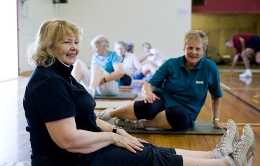16 July 2012
 Accredited exercise physiologists from the University of South Australia will show how exercise can be used as medicine during a Health Check @ UniSA open day this Saturday (July 21).
Accredited exercise physiologists from the University of South Australia will show how exercise can be used as medicine during a Health Check @ UniSA open day this Saturday (July 21).
The university will offer free health assessments to members of the public, to demonstrate how the old adage ‘no pain, no gain’ is no longer relevant and how exercise can play an important role in disease prevention and management.
UniSA’s Human Movement and Clinical Exercise Physiology program director Dr Maarten Immink says exercise doesn’t need to be a negative experience which causes people to distance themselves from physical activity.
“When done appropriately, exercise can be enjoyable. However, when people go for long periods of time without participating in physical activity, they lose sight of how to exercise in a way that is safe, enjoyable and meets their health needs and goals,” Dr Immink says.
“In these cases, people really benefit from exercise services provided by exercise physiologists who are university trained allied health professionals specialising in lifestyle modification and exercise prescription.
“Their advanced knowledge and skills qualify them to provide a high level of support on an individual basis using evidence-based exercise programs that take into account each person's unique factors which might include age, a medical condition, having a disability, or taking prescription medicine.”
Dr Immink says the guiding principle behind exercise as medicine is that physical activity and exercise are important to health and the prevention and treatment of many chronic diseases.
“Exercise can improve quality of life,” Dr Immink says.
“It can help manage diseases like diabetes, arthritis and cancer and it can also help turn these conditions around. This is because exercise works systemically across the whole body. If you’ve got diabetes for example, exercise will help manage your blood glucose levels, but it will also increase your bone density and make your cardiovascular system work better.
“Exercise as medicine is an important component of overall health and well-being that will assist in managing chronic conditions, has virtually no side effects and is safe.”
Cherie Noble is one of the university’s accredited exercise physiologists who will be on hand to offer advice at the Health Check open day. She is looking forward to sharing with the community what exercise physiologists do and how exercise physiology can benefit everyone.
“When you see an exercise physiologist, you will receive a thorough health assessment and the exercise you perform is specifically prescribed for each individual circumstance, taking into consideration a whole range of factors such as current conditions, risk factors and current commitments,” she says.
“When you see an exercise physiologist, it doesn’t mean you have to go to the gym. We work with what an individual needs – sometimes that is home-based activity, sometimes a gym activity or a combination of both. The old saying ‘no pain, no gain’ definitely does not apply here – the exact opposite in fact!”
Cherie encourages all interested people to come along and get a free health check.
“Everyone could use a health check and one of our roles is to help maintain and prevent. We can assist in identifying any risk factors and deliver advice on the changes you could make to your current lifestyle.
“Also if you haven’t prioritised your health in the past, this could be the kick start you need to bring it to the forefront. And those who consider themselves healthy but are not currently physically active should definitely come along.”
Health Check @ UniSA will be held this Saturday July 21, from 9am to 1pm at City East campus. For more information go to www.unisa.edu.au/healthcheck
Contact for interview: Dr Maarten Immink office (08) 8302 2675
Media contact: Kelly Stone office 8302 0963 mobile 0417 861 832 email Kelly.stone@unisa.edu.au



